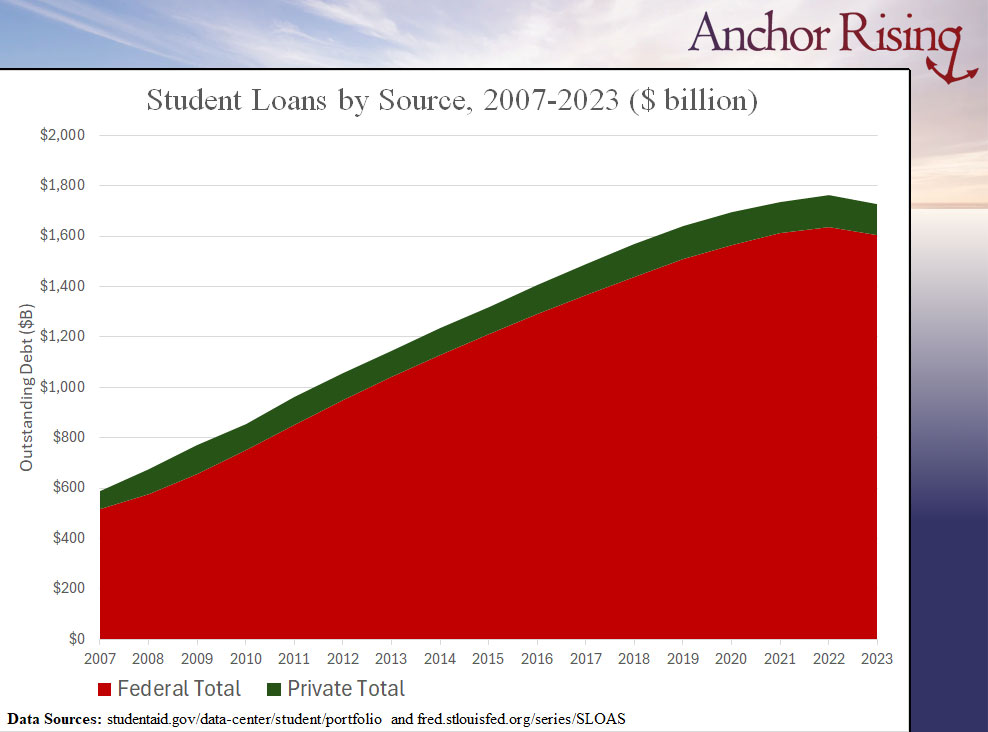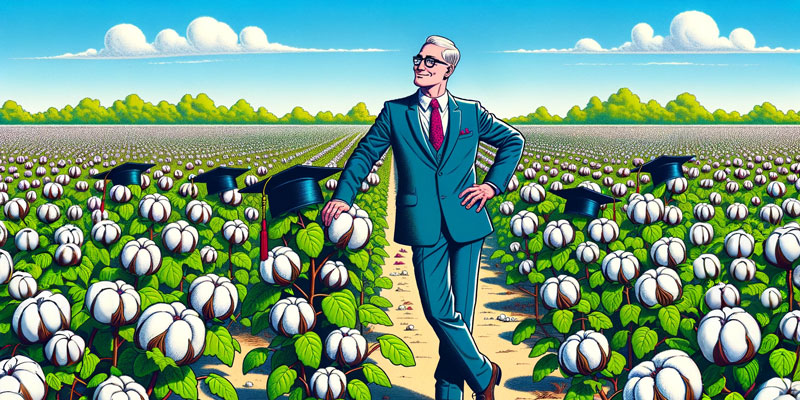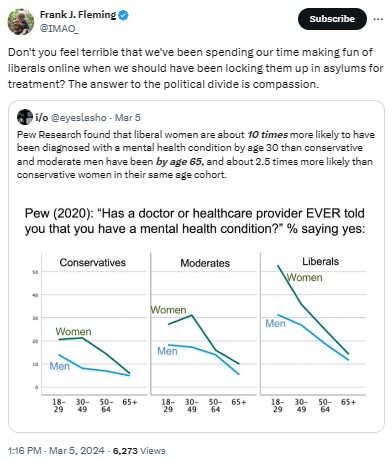Whatever one’s political leanings, the incentives of government must be understood as simply reality. Government agencies don’t have to create a product or service that people will voluntarily purchase. Rather, they must find activities for which they can justify forcing people who are not the direct beneficiaries to pay. This model is justified, in some circumstances, but its being justified does not change its nature.
The other day, I set out to find data on student loans because talk of the Biden administration’s passing graduates’ debt on to other people seemed to have been overstated. I thought most debt came from private loans, not government-backed loans, but I was wrong. Comparing the federal student loan portfolio with total securitized student loans suggests that private loans account for just 7% of the total.
Of course, the ratio is likely to vary significantly by income level. More research would be necessary to confirm this point and put some details to it, but lower-income families are probably more likely to have high federal debt, while upper-middle-income families have more private debt and wealthy families simply pay their college bills. Keep that differential in mind while considering the following chart.

Over this period, the amount of student debt has nearly tripled, up 193%. However, federal debt has grown 211%, while private debt has grown “only” 70%. During this time, the number of Americans ages 15 to 24 increased by only 1.4%, while the number enrolled in college has increased by just 5.5%. In short, we can infer that easy access to federal debt has encouraged some additional enrollment, but it has contributed to inflation of tuition by an order of magnitude more. And while it would certainly require a separate inquiry, the general sense one gets is that, if anything, the quality of education has gone down.
Now look at the other side of the ledger. That down-tick in debt over the past year is attributable to the Biden Administration’s transfer from the accounts of the students and graduates to the account of the American taxpayer. More importantly, the amount is hardly significant in the face of the increase, which is the observation that leads to the key point.
Commentators rightly complain that responsible borrowers and those who never went to college are being made to pay for other people’s degrees, and to note that many of those degrees are likely to be useless, reflecting something more like a four-year vacation from life than a communally beneficial training of future workers and leaders. In my view, however, the more-significant effect is on the borrowers themselves. They have been made serfs and products of the federal government.
The model of what I’ve called the “government plantation” is one in which politicians and other government officials cultivate recipients of government services (in this case, financial lending) for which they can charge other people. The cultivators take a cut of the money from the payers while also reaping the reward of votes from those who have been made dependent.
We see this process in operation with student debt. Government policy has transformed the debt load for higher education from reasonable to crushing, and one party, the Democrats, dangles the promise of relief in exchange for votes (even if it must be done without legal authority). But the relief it provides is only a fraction of the burden it has imposed, leaving its ability to promise more relief entirely intact.
With this arrangement, as with many others, the end result is not a benefit to the recipient or the payer, but a loss of freedom for all. Little wonder the powerful spend so much time cultivating, above all, a sense of animosity and division.
Featured image by Justin Katz using Dall-E 3 and Photoshop AI.
[Open full post]On WNRI 1380 AM/95.1 FM, John DePetro and Justin Katz discuss:
- Day of reckoning on the Washington Bridge… for whom?
- Homeless directors
- McKee’s raises
- Ken Block makes the local networks
- ABC6 hires a union agitator
- WPRI’s back-pay woes
Featured image by Justin Katz using Dall-E 3 and Photoshop AI
[Open full post]This is an interesting bit of data, and Frank Fleming’s response is humorous, but a question of causation and another bit of information are relevant:
The bit of information that’s missing is the percentage of each group who’s asked a healthcare provider to diagnose a mental health condition. No doubt, psychologists and psychiatrists could find something wrong with many a conservative and many a man.
The question of causation is more political. Progressivism is the ideology for mental illness. They reinforce each other, and the presence of the latter makes a person vulnerable to manipulation by the proponents of the former.
[Open full post]It’s hard to believe this is the conclusion of the CEO of the “business-backed” Rhode Island Public Expenditure Council (RIPEC):
The state should consider alternatives pursued by other states like road usage charges, electric vehicle charging fees, increased registration fees for hybrid/electric vehicles, or tolls (especially if the state is unsuccessful in its appeal of the ruling in the truck toll court case).
Mo’ money, mo’ money.
Rhode Island does not have a funding problem. It has a management and priority problem. Adding to the cost of living and funneling more millions through our corrupt government will not solve the problem.
It’d be interesting for somebody to do a study of the percentage of new money that actually goes toward increased time-on-task for infrastructure in the Ocean State, versus new hiring, increased pay, and graft. Unfortunately, RIPEC does not appear likely to be that somebody, despite being one of the vanishingly few groups with some resources and mission to do such things.
[Open full post]By its nature, advocacy journalism glosses over the details that many would consider crucial. Headlines from a pair of such articles by Katie Mulvaney in the Providence Journal illustrate the point:
Six months pregnant with nowhere to go – an unhoused woman’s plight on RI’s streets
After months of sleeping on the street, pregnant woman finally has a shelter bed
The first paragraph of the second article provides the journalist’s objective:
It took a week after a story highlighting her grim scenario, but the pregnant woman who spent months sleeping on the street in Pawtucket has landed in a shelter – with a lot of help along the way.
Understandably, journalists want to feel as if they’ve got the power to help people they want to help. The problem — especially when the same journalists are touchy about seeming to victim blame — is that the details that highlight the underlying problem become obscured. Thus, we end up with solutions that pour more money into problems while leaving the underlying incentives in place, which has the effect of subsidizing the problem, leading to more of it. The heroine of Mulvaney’s story is not the only pregnant woman in Rhode Island shelters.
It isn’t victim blaming to call out some of the notable details:
- The mother appears to come from a childhood with exposure to drugs.
- She is living on Social Security disability for some unreported malady.
- She was evicted last March for non-payment of rent.
- By the math, she became pregnant five months later.
- The father has a felony record, hasn’t had a stable home since he turned 18 five years ago, and implies he uses drugs.
- He is also living on Social Security disability.
The details suggest two important points. The first is that this is an extreme case. To the extent limited resources help others who could more easily help themselves (and invite people to bring their problems here), fewer are available for such mothers.
The second is that multiple layers of public policy are in play, here, including drug policy, criminal reform policy, policy governing payment for disabilities, broad policies affecting the health of the economy, and more. We can and should help such people, but if we want to stop the downward spiral that draws more Rhode Islanders into it, we have to begin rethinking our entire approach.
Featured image by Justin Katz using Dall-E 3.
[Open full post]These stories come much too quickly to keep up, digest, and consider, but Mel’s review of Letitia James’s campaign finance reports a few weeks ago is worth a look:
What might we find in RI, if we looked?
[Open full post]Letting 17-year-olds vote in primaries if they’ll be eligible to vote in the associated general elections is certainly reasonable, but that doesn’t mean we shouldn’t note a pair of conspicuous questions along the way.
Firstly, why do Democrats seem always to want to expand voting toward the most manipulable constituencies?
Secondly (and perhaps relatedly), why do our beliefs about maturity seem to be moving in contrary directions? Young adults can remain on their parents’ health insurance through the better part of their 20s, and they now typically stay in school nearly as late, where it’s apparently unfair to hold them accountable for the debt they incur. We expect them to take less and less responsibility later and later in life. Yet, the push is on to let them decide they want to mutilate their bodies to “become” the opposite sex at early ages and to let them vote on politicians who affect us all.
It’s almost like the intention is to keep them from growing up, confuse them, and then urge them to give government more power over our lives.
[Open full post]In the last couple decades, Americans (at least those who occupy seats in academia and mainstream media) appear to have lost their ability to distinguish between upholding a principle and supporting any given people who might benefit from that principle from time to time. Nobody likes to defend groups that are broadly deplored, like Nazis and the KKK, but it has become risky to do so, even where the principle is clear.
The latest disfavored group to ricochet through Rhode Island’s media echo chamber is PINE — the People’s Initiative of New England. The group’s purpose is to transform New England into a “White Homeland” that would secede from the United States. Like all such separatist groups (e.g., the black Rise of the Moors group that had an armed standoff with police on 95 a few years ago), the group’s mission is objectionable and kooky. Personally, I suspect I’d be welcomed by none, inasmuch as I’m white, Catholic, conservative, and have had conversations that left me with the impression my Jewish last name was getting a provisional pass based on this or that policy agreement.
Nonetheless, coverage of PINE’s appearance in Cumberland offers some warning signs of its own. Ethan Shorey’s article in The Valley Breeze is an example of the way in which journalists’ ideological poses and disregard for precision can undermine their profession and our ability to understand the world.
Consider the headline: “Supremacist group visits sites in Cumberland.” Strictly speaking, nothing in the literature the group was distributing suggests “supremacy.” That doesn’t mean they aren’t objectionable, but anthropologically, a distinction exists between a subculture that prioritizes its ethnic identity as a foundation for cohesion and health and one that believes its members are superior, implying subjugation and expansion. This is true regardless of the race in question.
Imposing “supremacist” as pejorative when it doesn’t strictly apply obscures understanding of the variety of groups and complicates identification of the causes of their problematic kookiness. If their motivation is retrenchment for social health, that’s not only a signal that they may correctly be identifying a problem (albeit with the wrong solution), but also an opportunity to undermine their divisiveness by addressing those problems in a better way. Transforming them into cartoon villains for the purpose of elite bonding lets grievances fester and invites conflict.
Similarly, Shorey later goes on to report that an “attempt to catch up with members and get them to explain their hatred for non-whites was not successful.” To be sure, the assumption of “hatred” would be fair from a reader of the news, but embedded in a supposed news article this way, it only conveys the reporter’s inability to write a few hundred words objectively. People pick up on such things, and even those who aren’t as extreme as PINE may wonder, when dealing with Shorey, whether he’ll give them a fair hearing. (I certainly wouldn’t expect it, myself.)
If our society is to have any hope of a future, we must renew our consensus about core principles, including among others the importance of clear, logical distinctions and of venues in which people can expect to be considered fairly. Without such principles, we’ll cease to be able to communicate or even coexist.
Featured image by Justin Katz using Dall-E 3 and Photoshop.
[Open full post]This legislation is hardly the most-pressing matter facing Rhode Island at the moment:
Sen. Frank A. Ciccone III and Rep. Enrique George Sanchez are sponsoring legislation to require most businesses in Rhode Island to pay their employees weekly.
Has either of these legislators ever had to make payroll for a business? One suspects they simply don’t understand the challenges of operating a business, so this seems like a no-brain crumb they can throw to the constituents to claim to be helping them.
They would exempt small government offices and nonprofits, which shows they have some dim understanding that the legislation could be harmful, but that’s just a special-interest nod. You otherwise have to conclude that they consider themselves competent to micromanage the entire Ocean State economy and don’t really care what the effects might be.
[Open full post]On WNRI 1380 AM/95.1 FM, John DePetro and Justin Katz discuss:
- An “unlawful presence”
- Biden undoes his Sista Solja moment
- McKee, Ruggerio, and the reality of the Washington Bridge
- Mysterious whale deaths confirmed not to be something nobody thought they were
- Pols’ relationship with WPRI
- Providence’s relationship with unions
Featured image by Justin Katz using Dall-E 3.
[Open full post]







